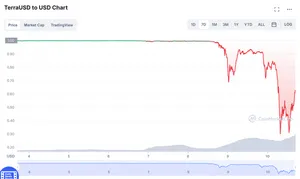The remaining project developers have tried to remain positive and restore faith in the community, accusing the developer who sold of "gluttony" and "greed". The project also implemented a steep 50% tax on remaining holders to discourage them from trying to sell.
G.O.A.T. token developer rug pulls for $260,000
Founder of popular Azuki project admits to past rug pulls
This news came as a shock to many lovers of Azuki NFTs, pricey NFTs which regularly trade for 20–30 ETH (~$45,000–$70,000). Azuki is not without its own controversies, recently facing accusations of insider trading.
- "A Builder’s Journey", by Zagabond
- Tweet by zachxbt
TerraUSD (UST) stablecoin dramatically loses its peg
The incentives that should keep TerraUSD trading at $1 have been put to the test lately, with a combination of spiraling cryptocurrency prices across the board and some apparent large sell-offs by those holding UST. The coin dipped down to $0.992 on May 7 before some large buys returned it close to its peg. It dipped again by a smaller amount the following day, reaching a low of around $0.994. These values may seem like small changes on the micro scale, but when major stablecoins diverge from their peg by even fractions of a cent they have major effects throughout the cryptocurrency ecosystem.
On May 9, UST saw its most extreme de-peg, plunging to $0.95, then again to $0.84 later that day, despite Luna Foundation Guard liquidating $1.3 billion in Bitcoin reserves to try to restore the peg.
Do Kwon, cofounder of Terraform Labs, initially seemed to be doing his best to portray confidence on Twitter by tweeting things that give the exact opposite impression. "If yall girls are gonna fud, try to do it during my waking hours pls," he wrote on May 7. "You could listen to [crypto Twitter] influensooors about UST depegging for the 69th time. Or you could remember they're all now poor, and go for a run instead", he tweeted, somewhat blithely acknowledging UST's repeated history of losing its peg. His tweets seemed to take a more serious turn beginning the evening of May 8, as the situation grew more dire.
Attacker steals $3 million from Fortress Protocol
The exploit caused the $FTS token to drop 42%. The creators of Fortress urged people not to supply any assets to the pool as the attack was ongoing, and tweeted "we need the support of all of our partners and key organizations in the community to assist and try to freeze and bring back the funds!"
Cashera makes off with $90,000
Despite all this, the project deployer suddenly minted 23 million CSR tokens, which they swapped for almost $90,000 in other assets, crashing the token value in the process by about 70%. The development team also took the project website offline.
Hunter defi project rug pulls for $1.2 million
The rug pull was first noticed by CertiK, a blockchain security firm that had also audited the project. "We pointed out these major centralization issues in their audit," CertiK wrote on Twitter.
Fury of the Fur rug pulls for $300,000
However, the NFT launch went poorly — fewer than 2,800 NFTs were minted out of the total supply of 9,671 NFTs. The project tried to relaunch but failed to drum up much more interest, so the creators apparently decided to call it quits — while keeping the money, of course. The project founder left a long message to the community, in which they said that they would be shutting the project and spoke at length about how difficult it had been for them.
Coinbase's new NFT marketplace hasn't had more than 200 transactions in a day since its public launch
Although the company claimed to have 3 million users on its waitlist, the public marketplace release has gone shockingly poorly given Coinbase's existing reputation. The platform has yet to see more than 200 transactions in a given day (compared to OpenSea, which regularly sees more than 100,000 transactions a day, or its smaller competitor LooksRare which sees more than 1,000 daily). Furthermore, the platform has only broken $50,000 in volume traded on five of the days it's been publicly available, with some days seeing only a few thousand dollars traded. OpenSea has been doing over $150 million in daily volume in that same time frame, and LooksRare around $100 million (though it should be noted that the prevalence of wash trading, particularly on LooksRare, makes these numbers hard to evaluate).
U.S. Treasury sanctions cryptocurrency tumbler Blender, the first sanction of its kind
The U.S. began sanctioning various wallet addresses belonging to the hackers in mid-April, though have faced obstacles given that it is trivial for the hackers to create new wallets. The use of cryptocurrency tumblers (also called "mixers") has also stymied the government's attempts to limit the DPRK's access to the ill-gotten funds. Blender is not the primary tumbler that Lazarus has been using — that would be Tornado Cash, which they have used to tumble more than $213 million from the hack. Tornado has taken perfunctory steps to comply with sanctions, but nothing that would meaningfully impact Lazarus' ability to use the service.
- "U.S. Treasury Issues First-Ever Sanctions on a Virtual Currency Mixer, Targets DPRK Cyber Threats", U.S. Department of the Treasury
Someone hijacks a Ferrari domain to host scam NFT mint
Sadly for the scammer, the scam was discovered and shut down when they had only managed to scam one person. The unsuspecting collector sent 0.3 ETH ($800), which the scammer transferred to Tornado Cash.
- "Ferrari subdomain hijacked to push fake Ferrari NFT collection", BleepingComputer










